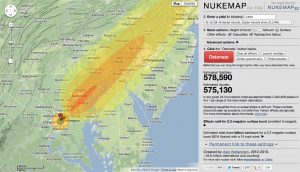 Forecasting an event is impossible because there are so many variables in season, location, local weather, and environment. You’ll have to do your own risk assessment to figure out what is most likely and prepare for those events. If you live near a fuel farm and there’s a leak you’ll face toxic fumes and severe air contamination if it catches on fire. Wildfires present the same type of problems, as could burning homes, tire fires, chemical and industrial accidents. Trucks and trains transport toxic materials every day, so if you live near highways and train tracks you’ll want to factor that in, particularly if you live near major intersections or bridges where accidents are likely to occur. Check your local airports to see if you live under the approach and departure paths, where plane crashes occur. You’ll want to check the seasonal wind patterns in your area to see if you live downwind from industrial sites, chemical production facilities, liquid gas storage tanks, pesticide manufacturers, toxic storage sites or nuclear power plants. Then there’s the threat of hypothermia from cold, and heat injury if it gets too hot. Finally, there’s the potential threat from your fellow human beings. If our infrastructure fails and unprepared people become desperate they’ll probably do things they wouldn’t ordinarily do. Are you ready for all of this?
Forecasting an event is impossible because there are so many variables in season, location, local weather, and environment. You’ll have to do your own risk assessment to figure out what is most likely and prepare for those events. If you live near a fuel farm and there’s a leak you’ll face toxic fumes and severe air contamination if it catches on fire. Wildfires present the same type of problems, as could burning homes, tire fires, chemical and industrial accidents. Trucks and trains transport toxic materials every day, so if you live near highways and train tracks you’ll want to factor that in, particularly if you live near major intersections or bridges where accidents are likely to occur. Check your local airports to see if you live under the approach and departure paths, where plane crashes occur. You’ll want to check the seasonal wind patterns in your area to see if you live downwind from industrial sites, chemical production facilities, liquid gas storage tanks, pesticide manufacturers, toxic storage sites or nuclear power plants. Then there’s the threat of hypothermia from cold, and heat injury if it gets too hot. Finally, there’s the potential threat from your fellow human beings. If our infrastructure fails and unprepared people become desperate they’ll probably do things they wouldn’t ordinarily do. Are you ready for all of this?
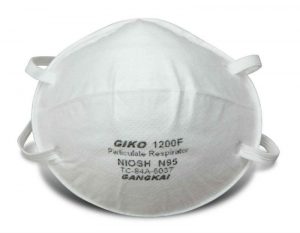 Respiratory filter. Inhaling dust, debris, burned petrochemicals, and other particulates can compromise your respiratory system and cause long-term health problems so it’s a good idea to keep as much particulate matter out of your lungs as possible, as our soldiers and emergency responders discovered during Desert Storm and during 911. Fortunately, it’s easy to protect yourself with a respiratory filter. Notice I said “respiratory filter” and not “dust mask”. A cloth can serve as a dust mask to keep the largest particles out but the smallest particles (0.3 microns) are the ones that enter deep into the lungs and cause the most damage. Dust masks just don’t cut it. Instead, you need an “N95 particulate respirator” ($12 for 20 @ Home Depot). These are highly efficient, tight fitting filters that remove 95% of the smallest particles. There are also N99 (removes 99% of particles 0.3 microns and larger) and N100 (removes 99.97%) that are also acceptable but can be more expensive ($7-10 each). All of these protect against dust and smoke particles from fires but do not remove fumes.
Respiratory filter. Inhaling dust, debris, burned petrochemicals, and other particulates can compromise your respiratory system and cause long-term health problems so it’s a good idea to keep as much particulate matter out of your lungs as possible, as our soldiers and emergency responders discovered during Desert Storm and during 911. Fortunately, it’s easy to protect yourself with a respiratory filter. Notice I said “respiratory filter” and not “dust mask”. A cloth can serve as a dust mask to keep the largest particles out but the smallest particles (0.3 microns) are the ones that enter deep into the lungs and cause the most damage. Dust masks just don’t cut it. Instead, you need an “N95 particulate respirator” ($12 for 20 @ Home Depot). These are highly efficient, tight fitting filters that remove 95% of the smallest particles. There are also N99 (removes 99% of particles 0.3 microns and larger) and N100 (removes 99.97%) that are also acceptable but can be more expensive ($7-10 each). All of these protect against dust and smoke particles from fires but do not remove fumes.
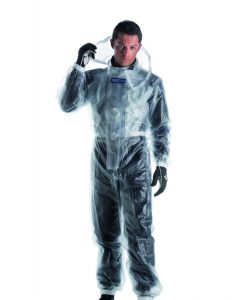 Waders, rubber boots and rain gear. These protect you against more than just rain. In floods we’ve seen sewers and septic systems overflow and turn flood waters into a disease ridden fecal bath. Exacerbating the problem, underground tanks, spilled chemicals, and vehicles will spill their contents into the ground water as well. Rubber waders, boots and rain gear will protect your skin against this toxic brew of contamination when you have to walk through it. A secondary use for rain gear is that it’ll protect you against airborne droplets of pesticides, chemicals, and nuclear particulate fallout in the case of a nuclear plant accident. Other than alpha particles from fallout though, they won’t protect you against the more penetrating forms of radiation like beta and Gamma.
Waders, rubber boots and rain gear. These protect you against more than just rain. In floods we’ve seen sewers and septic systems overflow and turn flood waters into a disease ridden fecal bath. Exacerbating the problem, underground tanks, spilled chemicals, and vehicles will spill their contents into the ground water as well. Rubber waders, boots and rain gear will protect your skin against this toxic brew of contamination when you have to walk through it. A secondary use for rain gear is that it’ll protect you against airborne droplets of pesticides, chemicals, and nuclear particulate fallout in the case of a nuclear plant accident. Other than alpha particles from fallout though, they won’t protect you against the more penetrating forms of radiation like beta and Gamma.
Physical Security and Operational Security (OPSEC). These are subjects that could fill a book. Rather than cover it here, please check out the “Home Security” button on the website.
 Do you NEED a weapon? Owning a weapon is a controversial and highly personal subject. Many people feel no weapons should be necessary in our society, while others are huge supporters of the 2nd Amendment. It is two months after three major storms struck Texas, Louisiana, Florida and Puerto Rico and the rate of crime in those places has not risen significantly. There was an initial surge in looting and armed robbery, but that dropped off after initiating a curfew from Midnight to 5am. In the past 60 days there are no reports of roving gangs or gunfights in the streets, so maybe the long-term belief that people will do those things in an emergency are unjustified. I won’t try to persuade you one way or the other, but would like to discuss the safety considerations of carrying weapons.
Do you NEED a weapon? Owning a weapon is a controversial and highly personal subject. Many people feel no weapons should be necessary in our society, while others are huge supporters of the 2nd Amendment. It is two months after three major storms struck Texas, Louisiana, Florida and Puerto Rico and the rate of crime in those places has not risen significantly. There was an initial surge in looting and armed robbery, but that dropped off after initiating a curfew from Midnight to 5am. In the past 60 days there are no reports of roving gangs or gunfights in the streets, so maybe the long-term belief that people will do those things in an emergency are unjustified. I won’t try to persuade you one way or the other, but would like to discuss the safety considerations of carrying weapons.
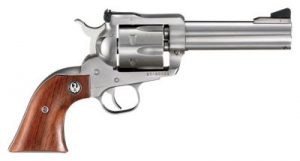 Handguns. The biggest threat from handguns is mishandling and accidents and I’ve lost two friends to that statistic. One was practicing his fast draw with his issue M9 while on staff duty one night and shot himself through the upper thigh. Despite what you see in movies, a thigh wound is quite serious and he bled out before reaching medical help. The second friend was carrying his .22 revolver in a shoulder holster while he was repairing a barbed wire fence. As he leaned over the truck tailgate to grab a roll of wire, the pistol fell out and struck the bumper on its hammer, firing a single shot into his liver. He died from internal bleeding but his body wasn’t discovered for several hours. Pistols are incredibly dangerous and require a lot of training and practice to carry safely. They’re difficult to control and fire accurately while under stress even if you practice a lot. Having said all of this I’ve carried a handgun for most of my career and know firsthand how quickly a handgun can turn a bad situation around. I’ve also seen bad situations made worse by introducing a handgun. Carrying a handgun is a heavy responsibility and your decision shouldn’t be taken lightly. Decide how you’ll carry the weapon: concealed or in the open. Concealed it’ll be difficult to draw, is uncomfortable, will constantly snag on your clothes, and is difficult to hide. Open carry may force your antagonist to fire first rather than give you a chance to draw your weapon. There’s no “good” or “right” answer to this.
Handguns. The biggest threat from handguns is mishandling and accidents and I’ve lost two friends to that statistic. One was practicing his fast draw with his issue M9 while on staff duty one night and shot himself through the upper thigh. Despite what you see in movies, a thigh wound is quite serious and he bled out before reaching medical help. The second friend was carrying his .22 revolver in a shoulder holster while he was repairing a barbed wire fence. As he leaned over the truck tailgate to grab a roll of wire, the pistol fell out and struck the bumper on its hammer, firing a single shot into his liver. He died from internal bleeding but his body wasn’t discovered for several hours. Pistols are incredibly dangerous and require a lot of training and practice to carry safely. They’re difficult to control and fire accurately while under stress even if you practice a lot. Having said all of this I’ve carried a handgun for most of my career and know firsthand how quickly a handgun can turn a bad situation around. I’ve also seen bad situations made worse by introducing a handgun. Carrying a handgun is a heavy responsibility and your decision shouldn’t be taken lightly. Decide how you’ll carry the weapon: concealed or in the open. Concealed it’ll be difficult to draw, is uncomfortable, will constantly snag on your clothes, and is difficult to hide. Open carry may force your antagonist to fire first rather than give you a chance to draw your weapon. There’s no “good” or “right” answer to this.
 Long Guns. Oddly, long guns seem less threatening to most people than handguns, especially if carried slung over a shoulder. I suppose people just don’t think you can put a rifle into action as quickly as a pistol, so don’t see it as a threat. Because rifles are longer and easier to control, you’re less likely to accidentally “sweep” the muzzle over people. Long guns require less training, are easier to become proficient on, are more powerful, accurate, and effective over much greater ranges than pistols. In the negative column rifle bullets penetrate much deeper than pistols, so those hitting buildings penetrate through many more walls which raises the odds of accidentally hitting someone.
Long Guns. Oddly, long guns seem less threatening to most people than handguns, especially if carried slung over a shoulder. I suppose people just don’t think you can put a rifle into action as quickly as a pistol, so don’t see it as a threat. Because rifles are longer and easier to control, you’re less likely to accidentally “sweep” the muzzle over people. Long guns require less training, are easier to become proficient on, are more powerful, accurate, and effective over much greater ranges than pistols. In the negative column rifle bullets penetrate much deeper than pistols, so those hitting buildings penetrate through many more walls which raises the odds of accidentally hitting someone.
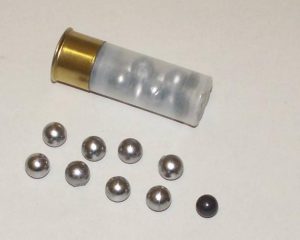 Shotguns. Nothing takes the steam out of an angry crowd faster than the appearance of a 12-gauge shotgun. Firing round buckshot, the BBs spread outwards as the distance from the muzzle increases. At short range, it is more devastating and deadly than a rifle, yet the inefficient round balls quickly lose their energy so penetration at distance is minimal. Shotguns don’t require a high level of marksmanship to hit targets and stress has a lesser effect on accuracy. If I could own only a single weapon, it would be a shotgun loaded with 00 buckshot.
Shotguns. Nothing takes the steam out of an angry crowd faster than the appearance of a 12-gauge shotgun. Firing round buckshot, the BBs spread outwards as the distance from the muzzle increases. At short range, it is more devastating and deadly than a rifle, yet the inefficient round balls quickly lose their energy so penetration at distance is minimal. Shotguns don’t require a high level of marksmanship to hit targets and stress has a lesser effect on accuracy. If I could own only a single weapon, it would be a shotgun loaded with 00 buckshot.
 Ammunition storage. I know guys that have a LOT of weapons and they all have problems with ammunition storage. More than once they’ve shown up at the range with a rifle in one caliber and ammunition in a different caliber. Likewise, I’ve known shooters that show up with a weapon and the correct ammunition but the wrong magazines. I’m convinced that owning 25 different weapons (each using different controls and magazines) in 7 or 8 different calibers is a fast way to mission failure. When choosing a weapon, consider a common model in a common caliber. Easier yet, find out what the local police are using. You can have confidence that law enforcement did extensive testing on their weapon and found it reliable. You can also be sure that the caliber they selected will be effective, and common (9mm, .40, or .45), not something wacky like a “.473 SuperScreamer” which would be hard to find ammo for. When storing ammo, take a lesson from the military and get a surplus metal ammo can to store it in. Moisture is the enemy of ammunition, so storing it in a waterproof military can is a good way to protect it. Regular practice should keep your ammunition rotated, but if you stockpile it, try to keep it less than 10 years old. Beyond that, the propellant becomes unstable and the primers unreliable.
Ammunition storage. I know guys that have a LOT of weapons and they all have problems with ammunition storage. More than once they’ve shown up at the range with a rifle in one caliber and ammunition in a different caliber. Likewise, I’ve known shooters that show up with a weapon and the correct ammunition but the wrong magazines. I’m convinced that owning 25 different weapons (each using different controls and magazines) in 7 or 8 different calibers is a fast way to mission failure. When choosing a weapon, consider a common model in a common caliber. Easier yet, find out what the local police are using. You can have confidence that law enforcement did extensive testing on their weapon and found it reliable. You can also be sure that the caliber they selected will be effective, and common (9mm, .40, or .45), not something wacky like a “.473 SuperScreamer” which would be hard to find ammo for. When storing ammo, take a lesson from the military and get a surplus metal ammo can to store it in. Moisture is the enemy of ammunition, so storing it in a waterproof military can is a good way to protect it. Regular practice should keep your ammunition rotated, but if you stockpile it, try to keep it less than 10 years old. Beyond that, the propellant becomes unstable and the primers unreliable.